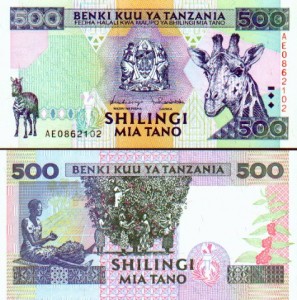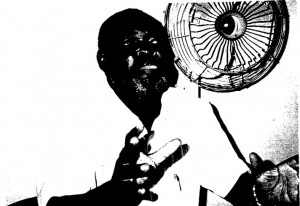There has never been anything quite like it in Tanzania or even in many other countries. Few administrations in the world seem to be as willing as the Mkapa government to wash their dirty linen in so public a way. There were screaming headlines and juicy stories in the press. Some tabloid newspapers began serialising it. And some big people were mentioned including a former prime minister, a cabinet minister, six former cabinet ministers, a former chief secretary, a chief engineer and a former mayor of Dar es Salaam.
The 521-page report published by former Prime Minister and Attorney General Joseph Warioba and his nine-person Presidential Commission has revealed corruption everywhere:
• in 20 lodges and hotels in game parks and in hotels in Dar es Salaam and Kigoma;
• in the offices of the Ministry of Home Affairs, the Attorney General, the ministries of education, health and lands;
• in the Treasury and the ‘Investment Promotion Centre’ where tax exemptions had been given to rich businessmen;
• in the use of the VIP lounge at the Dar es Salaam airport;
• in the National Bank of Commerce (uncovered loans);
• in 15 private companies (not repaying loans);
• in the social services (for example, demanding money for hospital beds);
• and especially in the police force where it was said to be deep-rooted throughout the hierarchy; and in the courts (‘judgements are written in the streets without even a hearing’);
• amongst journalists for ‘cheque book’ journalism – accepting bribes to write or not to write revealing stories; and so on.
The Warioba Report said that Tanzania inherited the ‘Colonial Anti-Corruption Law’ of 1958. The report went on: “Because at that time public servants observed ethical standards for civil servants and because corruption was limited to the lower and middle grade officers who had direct connections with the delivery of services to the public, this law was adequate. After independence, the public service expanded very rapidly, public servants started to behave contrary to the civil service code of conduct and began to use their offices for private economic gain …….it has become evident that the greatest source of corruption in the country is (now) not the poor economy and low salaries, although these too have played some part. The greatest source is laxity of leadership in overseeing the implementation of established norms …. most leaders do not understand the seriousness of the problem …. most believe that corruption is more widespread in the lower and middle grades of the public service. In the Police Force 123 policemen had been dismissed for corruption in the last six years but of these 120 had been constables and only one was of the rank of Assistant Superintendent … if we want to rid ourselves of corruption we must begin by cleaning the top leadership ranks:
The report makes a large number of recommendations covering all departments of government. Among recommendations are the following:
• the setting up of a ‘Truth Commission’ to prepare a code of ethics, to administer oaths, to take legal action against those making false declarations ….
• declaration by leaders of all presents received ….
• forfeiture of property for breaches of established rules …
• changes in the Anti-Corruption Bureau … the benefits for its employees should be improved;
• policemen should be transferred more frequently;
• the size of the government should be reduced …… and many more.
President Mkapa has announced that a team of experts is working on the feasibility of taking criminal action against those implicated in the report. If there was enough basis for action the culprits would be prosecuted. If not, disciplinary action like retirement would be instituted.
The Warioba Report had its critics. Munir Daya in the ‘Sunday News’ wrote that the persons mentioned in the report had been tried, convicted and punished by the press without them being given a chance to defend themselves. Ludovic Ngatara in the Dar es Salaam ‘Guardian’ used the simile ‘Unchained dogs after long captivity’ to describe the opportunity which had been offered, when, in the late eighties, the CCM’s unpopular ‘Leadership Code’ had been abandoned and replaced by the ‘Zanzibar Declaration’. ‘The unchained party and government leaders ‘ he wrote, ‘rushed for all sorts of whatever seemed to be of some value for enriching themselves’. The article then listed examples of these things, including funds levied for the construction of the CCM headquarters, foreign exchange obtained for export crops, donor funds, bank borrowings, land reserved for wildlife. . . . .. and went on to say that, since nearly all government and party leaders had been involved in corruption, the Warioba Commission should have named those who were not corrupt. “Everyone has been doing it, Why only us?” (Thank you Simon Hardwick for bringing this latter news to my attention – Editor).
MINISTER RESIGNS
A few days after the report was published, and in which he had been mentioned in connection with allegations about the issue of a hunting licence to the Deputy Minister of Defence in the United Arab Emirates, Dr. Juma Ngasongwa, Minister for Natural Resources and Tourism resigned from the government. This, he said, in his letter of resignation, was ‘to enable state organs to investigate the allegations that featured in the report’. President Mkapa replied by commending the Minister saying that by the action he had taken he had demonstrated his sense of accountability and loyalty to the CCM. At the hearing of a separate election petition in court in March however, which alleged infringement of election rules by Dr. Ngasongwa, the judge found that all the charges against the MP’s conduct of his election campaign had been ‘baseless’.
NEW ANTI-CORRUPTION MEASURES
On February 21 Prime Minister Frederick Sumaye directed the new Tanzania Revenue Authority to sack all its corrupt officials (“who are known to fellow workers” he said) before the end of their one-year probationary period. Instructions were also issued that by June 30, Ministers, Regional Commissioners, District Commissioners, and departmental and parastatal heads had to submit to the Prime Minister reports on the actions they intended to take to stop corruption in their respective jurisdictions in accordance with the Warioba Report.


